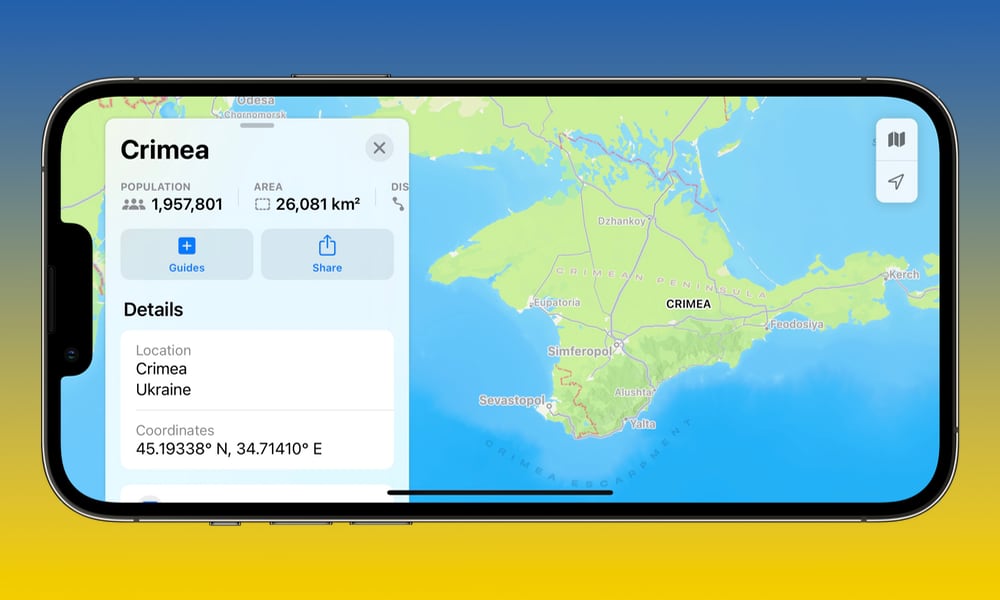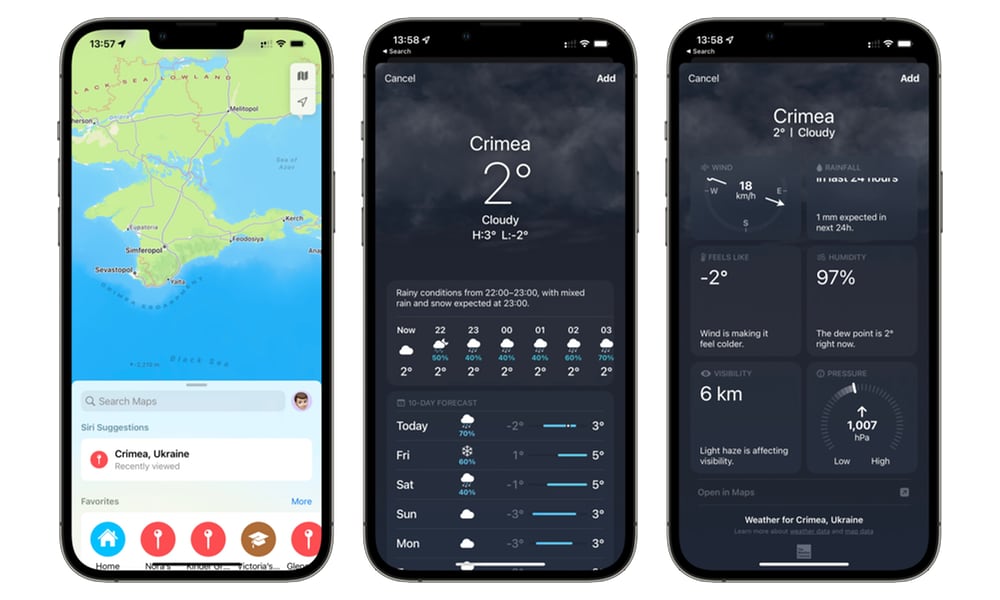Switching Sides | Apple Maps Now Shows Crimea as Part of Ukraine Rather Than Russia (Here’s Why)
 Credit: Jesse Hollington
Credit: Jesse Hollington
Toggle Dark Mode
Recent world events appear to be making Apple reconsider some of the controversial decisions it made as a result of its relationship with Russia in the past.
Two years ago, Apple found itself mired in the middle of a digital turf war between Russia and Ukraine over the status of Crimea, a small peninsula on the northern coast of the Black Sea.
Russian troops annexed Crimea from Ukraine in 2014, drawing condemnation from the international community, most of which refused to recognize the area as Russian territory.
Apple originally agreed, but after pressure from the Russian government over what it called an “inaccuracy” in the way Apple had labelled Crimea, it caved and designated the area as Russian territory — at least when viewed from an Apple device inside of Russia.
Apple insisted it had no choice under Russian law, which declared labelling Crimea as part of Ukraine to be a criminal offense in that country. Although it could have chosen to dig its heels in, that likely would have resulted in its expulsion from Russia and the banning of all Apple products from the Russian market.
It’s a stance that seems somewhat quaint and even ironic today, in light of Russia’s brutal invasion of Ukraine, where it’s now committing war crimes by deliberately bombing civilian populations.
Being kicked out of Russia is no longer a concern for Apple, considering it’s now voluntarily pulled out of the country almost entirely in response to Russia’s egregiously antisocial behavior. Under the circumstances, it’s pretty hard to have any respect at all for Russian laws, especially when it comes to laws concerning Ukraine.
‘Crimea, Ukraine’
Technically speaking, in 2019 Apple only changed Crimea’s status in Apple Maps for Russian users. Outside of Russia, Apple simply refused to take sides at all, labelling Crimea as undefined territory, suggesting it effectively belonged to no one.
Needless to say, Ukrainian officials were not impressed with Apple’s decision. The country’s minister of Foreign Affairs, Vadym Pristaiko, denounced it on Twitter, asking Apple how it would feel if its worst enemy stole its work.
Ukraine’s U.S. Embassy also made a point of telling folks to remind Apple that Crimea is “under Russian occupation — not its sovereignty.” After invading Russian troops took over Crimea, a puppet government held a referendum that only offered Crimean citizens a choice of how they wanted to leave Ukraine, not whether they wanted to do so in the first place. As one would expect from a referendum held at the end of a gun, it was considered illegal under international law.
In the weeks following, Apple promised to take a ‘deeper look’ at how it handled disputed borders, although it continued to insist that it was only complying with Russian law. Still, it had no such obligations outside of Russia, and it could have relabelled Crimea as part of Ukraine at any time for the rest of the world.
Now, it looks as if it’s finally relented and done exactly that, although it’s sad that it took a war to make Apple see the error of its ways here. As first spotted by Mashable, Apple Maps now clearly marks the Crimean Peninsula as part of Ukraine.
Searches for “Crimea” identify it as “Crimea, Ukraine” in Maps, Weather, and even Apple’s Calendar app. Third-party apps that use Apple’s location services also report it in the same way, since they’re pulling the information from Apple’s database.
It’s unclear when Apple actually made the change, or how Crimea appears to Apple Maps users inside of Russia. Of course, it’s not even clear if iPhone users inside of Russia have access to Apple Maps at all anymore. Apple has said that it has “limited” many of its services inside of Russia in response to the invasion, although it hasn’t elaborated on which ones are impacted beyond Apple Pay, which is already blocked by international sanctions against Russian banks.







